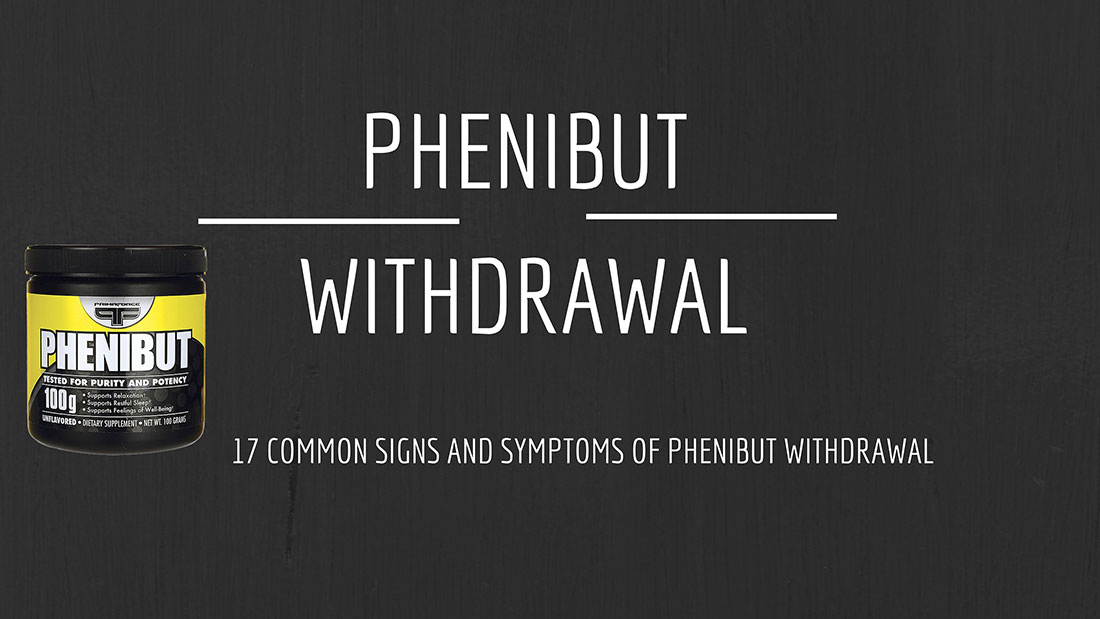In 2013, a study was done to examine a patient who used phenibut to self-medicate his anxiety, insomnia and craving for alcohol.
While this treatment was initially effective, he developed dependence which led to significant withdrawal symptoms.
It took him 9 weeks to of treatment to stop the withdrawal symptoms.
What Phenibut Does

Over the years, Phenibut has proved to be an indispensable lifesaver for guys who suffer from depression and social anxiety.
Many users, especially those who cannot afford insurance, take it not as a recreational drug, but as one would take his Lexapro.
Users born with weaker GABA receptors or those who’ve had their receptors damaged from constant and prolonged usage of alcohol and drugs take phenibut to decrease anxiety and to help with an increase in positive feelings.
A lot of users report that it works better than prescriptions such as anxiolytic. A dose as small as 500mg per week is enough to take you through the week feeling like a king.
It is this exuberant effect that, however, comes back to haunt a lot of users who are not responsible. You take it once and feeling the potency it has, you become hooked.
Ultimately, a lot of users end up developing nasty dependence and subsequent withdrawal issues- the reason why it has been banned for sale on Amazon.
Like any other nootropic, Phenibut should be treated with respect.
It is important that you follow the right prescription schedule. Otherwise, you will have hellish withdrawal symptoms to deal with.
17 Common Signs and Symptoms of Phenibut Withdrawal
Here are common phenibut withdrawal signs and symptoms you are likely to experience.
- Stress
This symptom has been reported frequently. When you abruptly discontinue taking your dose of phenibut, your brain will take a while to go back to its equilibrium.
What does this do? The GABAeric transmission is interrupted causing disarray in the brain. This results to stress.
You can however reduce the severity of stress by slowing down your taper.
- Agitation and Irritability
Most people have reported feeling restless, nervous or shaky during the first few days after stopping phenibut.
Remember, this brain supplement helps you to relax and therefore discontinuation will make you feel unsettled, uneasy and accumulate anguish.
However, do not panic. These withdrawal symptoms will subside after a few weeks and you will get back to your normal self. You can achieve this by distracting your mind with activities like running or going to the gym. You can also plan for an activity you love with friend, to help distract your mind.
- Decrease in Appetite
You will not be too enthusiastic about food after discontinuing phenibut. This is as a result of the alteration of certain brain chemicals that control appetite. See, phenibut contributes to the metabolism of one of the chemicals called dopamine. Dopamine regulates appetite.
Abrupt withdrawal of this nootropic supplement means that dopamine metabolism will decrease. As a result, you will find that your favorite food does not excite your palate.
- Depression
You will likely experience moodiness after quitting phenibut. This may lead to a mild case of depression. This symptom is not very common. Your mood however improves a few weeks after your last dose.
This is thought to be caused by changes in GABA and dopamine (it is the feel good hormone).
You can
- Dizziness
M any of us have trouble getting to sleep. As a result we do not sleep enough. Phenibut has been used to counteract this problem by altering the GABA(B) receptors and the alpha2 delta calcium channels.
any of us have trouble getting to sleep. As a result we do not sleep enough. Phenibut has been used to counteract this problem by altering the GABA(B) receptors and the alpha2 delta calcium channels.
Phenibut has been used in Russia to help clients with sleep and equilibrium problems.
When this process is stopped, your guess is as good as mine – you will experience dizziness for some days. But not to worry, this will improve a few days after taking your last dose.
- Depersonalization
This means that you have an ‘out of the body’ experience after quitting taking phenibut. That you will feel ‘unreal’ and your thoughts will not make sense - a trance experience.
This is as a result of the alteration of the GABA process in your brain.
When you immediately discontinue taking phenibut, withdrawal symptoms increases leaving you feeling stressed and anxious and as a result, you will feel a sense of depersonalization. This normally ends a few days later.
- Exhaustion
This symptom has been frequently reported by people who have stopped using phenibut during the first week.
It is quite a challenge to individuals who have an active lifestyle. Say for example you are a student, an employee with a busy organization of a sports person, you will notice that your energy levels will decline.
However, this will not linger for long. Your energy levels will retune after a few days. You can help this process by avoiding stressful and strenuous situations. Taking deliberate breaks once in a while to rest and sleep will help your body and mind to recover.
- Heart Palpitations and Increased Pulse Rate
It is very likely you will feel a change in your heart rhythm after quitting phenibut. You will feel your heart beating forcefully and quickly. You will also notice a rapid increase in your impulse rate.
This occurs due to the influence of Phenibut on the sympathetic pathways and stress caused by alteration of the GAMA process. Anxiety and high blood pressure have been reported as a result in some cases.
You can counteract this by engaging in relaxing activities. Also, consult with your caregiver if you have experienced any heart problems in the past.
- Sleeplessness/insomnia
Sleeplessness throughout the night is common among most users after discontinuing phenibut. You will feel tired after a day in school or at work but you will experience difficulties getting yourself to sleep. Imbalances of the GAMA neurotransmissions are responsible for this phenomenon.
You can counteract this by taking temporal sleep-inducing supplements like melatonin. What this does is, it will combat sympathetic arousal. You will eventually enjoy your beauty sleep.
- Nausea and vomiting
Abrupt discontinuation of phenibut will leave you feeling nauseated. This experience will be felt throughout the first week after quitting. You will feel better after a week or two of discontinuation of phenibut.
Why does this occur? You body is craving a dose of phenibut that is not forth coming. It is fighting back.
You might want to consider slowing down the process of discontinuation.
- Muscle tension
Most people who quit taking phenibut experience muscle stress. This comes about when the GAMA process is interrupted. Remember we said earlier that the GAMA process help to relax the muscles.
Another possible cause of muscles stress is psychological anxiety. These symptoms however reduce in the next few weeks. You can have a massage or engage in a relaxing activity that will help you relax.
- Cognitive Deficits
A research that was done among individuals who take high doses of phenobit reported them to having experienced brain fog and cognitive deficits. You will experience a decrease in your attention span. Making simple decisions will seem like an uphill task, and at this point you may also question your IQ. This is as a result of phenibut withdrawal.
Take the recommended dosage and go slow on the quitting process to reduce the severity of these symptoms.
- “Fear of the Unknown”
A couple of guys who have quit on phenibut have reported having feelings of primal fear. They unconsciously feel threatened and always feeling on guard. You will feel particularly highly alert and sensitive to external stimuli. You might even find yourself looking over your shoulder to see if there is any possible threat.
These are just mild cases of paranoia that go away within a few days or weeks. You can memorize some self reassuring mantras to remind yourself once you experience these sensations.
- Tremors
This is also one of the most common symptoms of phenibut withdrawal. Individuals have reported experiencing chilly tremors or uncontrollable shaking. This may happen at different times during the withdrawal phase and it can be unsettling.
It is therefore advisable to avoid operating machinery or anything that may require technical accuracy; otherwise this could lead to distorted results. You don’t want to lose your job or give inaccurate reports at your workplace. It could also cause you and others bodily harm.
Should this persist, you might want to consider going slow on tapering your phenibut dose.
- Limb Pain or Slight Numbness.
This is very uncommon. However, a few cases have been reported where users have described experiencing numbness and pain in their limbs. They have described feeling the pain deep within the muscles.
This symptom subsides within a few days as the body achieves its equilibrium.
It is important to take the recommended dosage otherwise you may get more than you bargained for.
Phenibut withdrawal symptoms vary from one individual to another. The symptoms are not life threatening. One can easily manage them when proper steps are taken. However, the severity of phenibut withdrawal symptoms is dependent on the duration of time and the amount used. This may last between a few days to a few months.
You will experience these symptoms from a few days to a few months. To minimize the severity of these symptoms and minimize dependence, avoid taking phenibut too frequently or taking continual large doses. The withdrawal symptoms are known to really suck. You don’t want that.
If prior to taking phenibut you have experience depression or have had addition tendencies and poor self control, avoid this product altogether. Researching about phenibut will help you make a well informed decision.
Should you be experiencing the above listed phenibut withdrawal symptoms, and you feel concerned, quickly consult your primary care giver. Stay safe.
